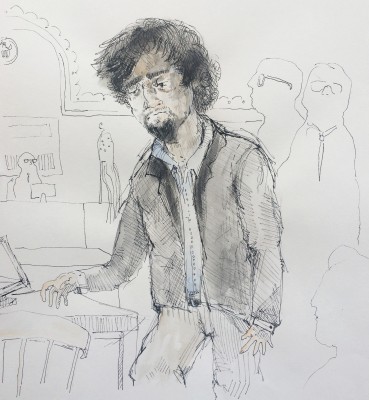
Attorneys for Dzhokhar Tsarnaev explored the environment the defendant would face serving time at the United States Penitentiary Administrative Maximum Facility, also known as ADX “supermax,” on the seventh day of defense testimony in the penalty phase of Tsarnaev’s trial.
Tsarnaev, 21, formerly a student at University of Massachusetts Dartmouth, faces the death penalty on 17 of 30 charges for placing two bombs at the finish line of the 2013 Boston Marathon, killing three and injuring more than 260.
The prosecution cross-examined Mark Bezy, a retired Bureau of Prisons official, who described the isolation Tsarnaev would face at ADX. Since its opening in 1994, the prison has been home to 34 convicted terrorists and many more of America’s worst criminals, including traitors and serial killers.
The jury was presented with a bleak, snowy aerial view of the compound in Florence, Colorado. Compared to other maximum-security prisons, Bezy said, ADX is “a whole different world.”
“It’s a whole different game,” he said. “You’re mixing apples and oranges.”
Bezy said the “H unit,” where convicted terrorists live with restrictions even tighter than those of the general ADX population, receive very little contact with other inmates and visits and phone calls must be pre-approved by the U.S. Attorney General.
On Wednesday the defense asked Bezy about “special administrative measures,” known as SAMs, which regulate an inmate’s communication with the outside world, The Daily Free Press reported. Inmates under SAMs have restrictions on phone calls and visitations, he said.
Inmates under SAMs at ADX are allowed certain amenities, but on a very restrictive basis, Bezy confirmed. They are allowed to write and receive an unlimited number of letters if those who send and receive them are on the approved SAMs list.
Bezy said incoming letters are opened, screened and then delivered to inmates. Outgoing letters are inspected, sealed in front of the staff and then sent out.
When prosecutor Steven Mellin asked whether Bezy was aware of how inmates often abuse this privilege by writing in code or using other strategies, the defense objected. U.S. District Court Judge George O’Toole did not allow the question to be answered.
The jury was sent home early after prosecutors and the defense team met with O’Toole in private. O’Toole told the jury that he and the lawyers had “some things that need to be worked out.”
Editor-in-Chief. Bostonian by way of Indiana. Excessive Instagrammer. Seltzer addict. Journalism junkie, storytelling fiend.




